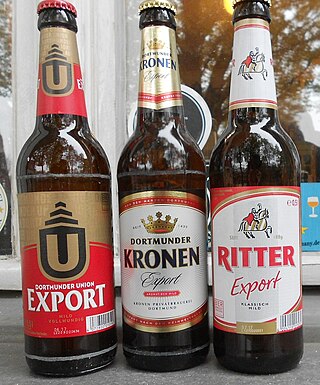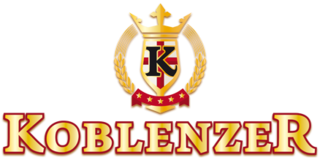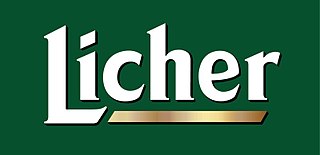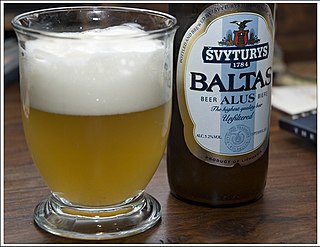
Tsingtao Brewery Co. Ltd. is China's second largest brewery, with about 15% of domestic market share and also accounts for half of China's national beer exports. The brewery was founded in 1903 as an Anglo–German business with the brewery under the supervision of master brewers from Germany in Tsingtao, Kiautschou Bay Leased Territory, a 552 km2 (213 sq mi) area leased by the government of China to Imperial Germany.

Pale lager is a pale-to-golden lager beer with a well-attenuated body and a varying degree of noble hop bitterness.

Holsten Brewery is a brewing company founded in 1879 in what is now Hamburg's Altona-Nord quarter. The group now has seven breweries in Germany. Its nationally distributed premium brand is the pale lager Holsten Pilsener. The company was acquired by the Carlsberg Group in 2004.

Tyskie is a Silesian-Polish brand of beer. Its name comes from the brewery located in the Upper Silesian town of Tychy. It is brewed by the Tychy Princely Brewery, part of the Kompania Piwowarska brewery group, which was acquired by Asahi Group Holdings in 2017.

Henninger Brewery was a notable brewery in Frankfurt, Germany. The Henninger brewery in Frankfurt traces its roots to 1655 in Eberhard Stein's brew house. In 1873 Heinrich Christian Henninger, who came from Erlangen/Bavaria, entered the brewery. In 1881 it was transformed into a stock company and changed its name into "Frankfurter Bierbrauer-Gesellschaft - vormals Henninger und Söhne". After several expansions and acquisitions it changed its name again in 1935 to its final name Henninger-Bräu AG.

Dortmunder Export or Dortmunder is a pale lager originally brewed by Dortmunder Union in Dortmund, Germany, in 1873. It is a soft-textured beer influenced by the Pilsner lager brewed in Pilsen.

Krombacher Brauerei is one of the largest privately owned breweries in Germany and ranks number 2 among Germany's best selling beers.

Koblenzer Brauerei was a brewery in Koblenz, in the Rhineland-Palatinate state of Germany. Since its foundation in 1689, it had a tradition of brewing beer in the Old Brewery in the historic center of Koblenz. In 1992, the Königsbacher Brewery was taken over by the Karlsberg Group. The Königsbacher Brewery's brands, but not the brewery building, were sold to the Bitburger brewery in early 2010. The brewery was sold and re-incorporated in 2012, the brand Königsbacher was abolished and the beer sold under the new brand Koblenzer. The brewery again entered insolvency proceedings in November 2023, and, since no new investors could be found, was finally shut down on January 31, 2024.

Ottakringer is the last large brewery remaining in Vienna, Austria, and is located in Ottakring, the 16th district of Vienna.
Dortmunder means someone or something from Dortmund, Germany. It may refer to:

Piels Beer, also called Piel Bros. Beer and Piel's Beer, is a regional lager beer, originally brewed in the East New York section of Brooklyn, New York City, at 315 Liberty Avenue.

Licher is a brewery in Lich, Germany. With 250 employees, the brewery is the largest in Lich. "Licher Beer" has been market leader since 1988 in Hessen and is known to be one of the top 20 beers in the German beer market.

Baltic Beverages Holding is a brewing company owned by Carlsberg Group. It is a significant operator in the brewing industry in the Baltic states and Ukraine.
Hasseröder is a brewery in Wernigerode, Saxony-Anhalt, Germany.
DAB, dab, dabs, or dabbing may refer to:

Oettinger Brauerei is a brewery group in Germany. Oettinger was Germany's best selling beer brand between 2004 and 2013 with an annual output of 6.21 million hectolitres (5,290,000 US bbl) in 2011.
Brau und Brunnen AG was a German brewing and beverage group which was formed as "Dortmunder Union-Schultheiss Brauerei AG" in 1972 through a merger between Schultheiss-Brauerei and Dortmunder Union-Brauerei. It was renamed Brau und Brunnen in 1988. It owned a number of formerly independent breweries, including Einbecker Brewery. Until the early 1990s, Brau und Brunnen was the largest beverage company in Germany, but its market share steadily declined throughout the 1990s. An additional cause for the decline was the company's purchase of Bavaria – St. Pauli Brewery and Jever for an estimated 800 million DM, although these purchases were later estimated to only be worth closer to 250 million DM. Other companies engaged in a series of mergers and acquisitions, and by 1999, it had sunk to the fourth-largest beverage company and was continually losing money. After unsuccessful internal reorganizations, the company was purchased by Dr. August Oetker KG and integrated into its subsidiary Radeberger Gruppe.
Radeberger Group is the largest brewery group in Germany. It is headquartered in Frankfurt am Main and produces beer at 16 different locations. With an approximate annual production volume of 13 million hectolitres, the group accounts for approximately 15% of German beer production.

Kronen Brauerei, also known as Private Brewery Dortmund Kronen, was one of the oldest breweries in Westphalia and has its headquarters at the Old Market in Dortmund. The company was able to look back on more than 550 years of brewing tradition and was family-owned from 1729 until 1996. Dortmunder Kronen was a sponsor of Borussia Dortmund between 1992 and 1996. The motto of the partnership was "Kronen und BVB. We are going for Dortmund together." It was acquired by Dortmunder Actien Brauerei in 1996, which is part of the Radeberger Group. Its headquarters are now home to the "Wenkers" catering business. The brand continues to be manufactured.
















